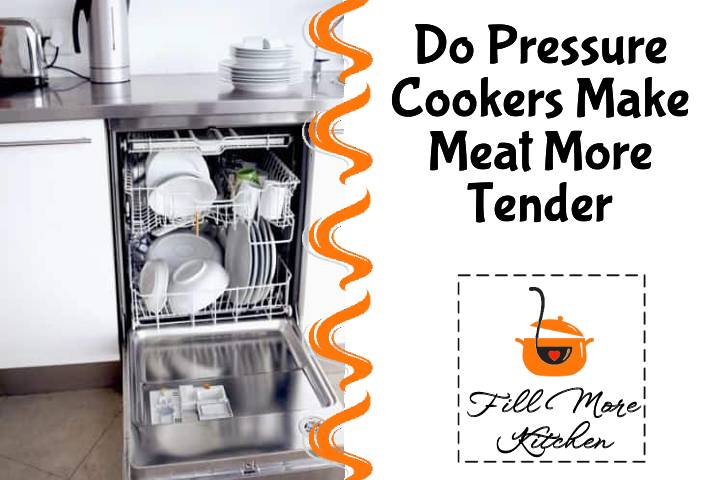For numerous people, concluding the day with a satisfying meal consisting of warm vegetables and a tender piece of meat, topped with sauce, gravy, or herbs and spices is ideal.
To achieve tender meat, one can either opt for a naturally tender variety or slow cook tough meats for an extended period. However, this method may not be suitable for families who require quick meal preparation and prefer using a pressure cooker.
The inquiry persists whether pressure cookers enhance the tenderness of meat or not. The answer is affirmative, as all kinds of meat cuts can turn more tender in a pressure cooker. Although certain meats may naturally become more tender than others, provided that you utilize appropriate cooking techniques, you can achieve a very tender and juicy state for all types of meat.
Further down, we will delve into the various factors that determine the tenderness of a cut.
Why Does Pressure Tenderize Meat?
Several factors contribute to the answer to whether pressure cookers make meat more tender, including the mechanics of pressure cooking and how it affects the structure of your meat cuts during the cooking process.
- Pressure Cooker Mechanism: By tightly sealing the lid, a pressure cooker creates a high-pressure environment inside the pot, causing water to turn into steam at temperatures higher than the usual boiling point of water, which speeds up the cooking process for various recipes.
- The Impact of Cooking on Meat Cuts: The tenderness of meat depends on the amount of collagen it contains and how quickly it can be broken down. Collagen is a structural protein in meat that acts as connective tissue, holding the meat together. The more collagen present, the tougher and chewier the meat will be. Pressure cooking breaks down the collagen sheaths due to high atmospheric temperature, converting them into gelatin, which enhances the flavor, texture, and tenderness of your meat.
Do Pressure Cookers make meat more tender? Slow cookers can also achieve this result – but what’s the contrast between the two? I wrote an article a while ago that compares the two appliances, and you can find it here.
How Does This Work Exactly?
Heating collagen at a temperature range of 160 to 205 degrees Fahrenheit causes it to melt and break down into gelatin, but this process can be time-consuming and take several hours.
When using a pressure cooker, collagen breakdown occurs at an accelerated pace due to the high temperature that can reach up to 300 degrees Fahrenheit. This process results in the coating of muscle fibers with gelatin, which is responsible for making meat more tender.
What Other Factors Determine How Tender a Cut Can Get?
- Collagen Content in Meat Cuts: The amount of connective tissue in a meat cut determines how much it will break down when cooked in a pressure cooker. Beef round, being leaner and containing less fat, collagen, and elastin, is less likely to become succulent compared to a braised bone chuck roast that has more connective tissue.
- Cooking Time is Crucial. When using a pressure cooker, even a slight difference of one or two minutes can determine whether your meat will be juicy and tender or tough and dry.
- Cartilage Content in Meat Cuts: Although not connective tissue, cartilage is a collagen source that can transform into gelatin when simmered. The tenderness of the entire dish can be affected by the quantity of cartilage present in bone-in meat cuts.
- Begin at Room Temperature. Before searing your meat and placing it in the pressure cooker, it’s advisable to let it thaw slowly or warm up to room temperature. This is because a sudden change in temperature can cause the muscle fibers to contract and toughen, resulting in longer cooking times to undo this effect.
Can You Overcook Meat in a Pressure Cooker?

Similar to other cooking equipment, a pressure cooker can potentially overcook meat. Meat that is pan-fried may end up dry and charred, while meat that is overcooked in liquid could turn out mushy and lacking in flavor. Therefore, what are the characteristics of overcooked meat from a pressure cooker?
Even though it is surrounded by liquid, the meat still ends up being tough and dehydrated, almost as if all the moisture has been squeezed out of it like a damp cloth.
Nevertheless, if you persist in cooking the meat as if it were in a slow cooker, it will eventually undo this outcome by reintroducing moisture into the meat, resulting in excess liquid that can be used to prepare gravy.
How Long Does it Take for Meat to Cook in a Pressure Cooker?
The cooking duration of meat in a pressure cooker relies on the maximum pressure that the cooker can achieve, with most contemporary models capable of cooking at 15 psi (lb.), which is the quickest rate possible.
If your pressure cooker is not capable of achieving 15-psi pressure, you might need to increase the cooking time for all your recipes. The duration required for meat to cook in a pressure cooker using the highest temperature available on a 15-psi model is provided below.
| Beef, Stew Meat 1 ½ Cubes | 15 Minutes |
| Beef, Meatballs 1-2 LBS | 4-9 Minutes |
| Beef, Steak 1-2â | 20-25 Minutes |
| Beef, Dressed 2LBS | 10-15 Minutes |
| Beef Ribs, Short Grilled | 15 Minutes |
| Beef Ribs, Short Stewed | 20 Minutes |
| Chicken Breasts (Bone) 2-3LBS | 8-10 Minutes |
| Chicken Drumsticks | 5-7 Minutes |
| Chicken, Ground | 4 Minutes |
| Chicken, Frozen (Boneless) | 7-10 Minutes |
| Chicken, Whole 2-3 LBS | 12-18 Minutes |
| Chicken, Whole 3-4 LBS | 18-26 Minutes |
| Duck, Whole 3-4 LBS | 25-30 Minutes |
| Lamb, Chops 1â | 10-18 Minutes |
| Lamb, Leg | 35-40 Minutes |
| Lamb, Stew Meat | 12-15 Minutes |
| Pork, Roast | 40-46 Minutes |
| Pork, Ham Pieces | 20-25 Minutes |
| Turkey, Breast (boneless) | 20 Minutes |
| Turkey, Breast (Bone) Whole | 20-30 Minutes |
| Turkey, Drumsticks | 12 Minutes |
For more details on the amount of time needed to cook with a pressure cooker, please click here.
3 Tips for Cooking with Meat in a Pressure Cooker
While cooking, it might be tempting to rely on your culinary intuition, but using a pressure cooker alters the process significantly as it involves working with a sealed container.
When pressure cooking, it is crucial to focus on the start of the process as preparation plays a vital role; there are no opportunities for checking doneness, tasting flavors, or adjusting seasoning during cooking.
- Get Your Meat Ready. Although it may be tempting to just toss everything into the pressure cooker and start cooking, it is important to begin by removing any connective tissue that you can from your meat. This involves using a sharp knife and honing your butchering abilities. Eliminating excess sinew and cutting against the grain of the meat will result in a more tender finished product.
- It is advisable to brown the meat beforehand. By searing the meat, you can lock in its natural juices before placing it in the pressure cooker.
- Myth: Marinating makes meat tender. Fortunately, marinating is not necessary to achieve a tender and succulent outcome when using a pressure cooker, although it can enhance the taste. The pressure cooker aids in infusing the flavors into the meat, enhancing its overall flavor.
For those who are inexperienced in using a pressure cooker to cook meats, it is advisable to conduct some preliminary investigation and locate a reliable and superior recipe to adhere to.
When combined with a high-quality meat and the appropriate cooking method, this will produce a delectable outcome.
You can also check this video about “Do Pressure Cookers Make Meat More Tender?”
Check out our top 10 reviews!
Related posts
https://fillmorekitchen.com/why-does-my-pressure-cooker-leak/
https://fillmorekitchen.com/pork-loin-vs-pork-chop-the-differences/
https://fillmorekitchen.com/can-sourdough-starter-go-bad-in-the-fridge/
https://fillmorekitchen.com/food-that-should-not-be-dehydrated/
https://fillmorekitchen.com/7-condiments-that-dont-have-to-be-refrigerated/



